Kickstarter is awesome. And dangerous to wallets. But also awesome. Ryan North, creator of Dinosaur Comics, editor of the Machine of Death books and generally hilarious guy wrote a 700+ page version of Hamlet with updated language and in the format of a choose-your-own-adventure novel. He went to Kickstarter to raise the money to get it printed and published as an actual book. I had a bunch of those books when I was little so I really couldn't help but lend support (in return for a signed copy of the book).
The campaign ended up being the #1 most funded publishing project ever on Kickstarter. His goal was to raise $20,000 but the final count was $580,905 (that's 2904% funding). With all the extra money Mr. North increased the scope of the project significantly. Instead of a simple paperback with a few black-and-white illustrations the final product ended up having over 110 illustrations in full colour done by some of the best artists in the web-comic community. He also published a special hardcover version, signed all the books, made an e-book version, an audiobook version (how does that even work??) and a short choose-your-own-adventure prequel to Hamlet called "Poor Yorick." As a result of the huge support he has decided to do "Romeo and Juliet" in the same format. Plus he bumped up the rewards a bunch adding stickers and bookmarks and temporary tattoos and things. He also donated 400 copies of the book to schools and libraries.
But what about the book itself? Well it's awesome and hilarious as expected. Your first choice is which character to be: Hamlet, Ophelia or the king (Hamlet's Dad). If you play as the king you die right away (murdered by Claudius obviously), but then you get to continue reading as a ghost. The choices that follow the original play are marked with little Yorick skulls so I read those first. It's pretty funny because the narrator is constantly questioning you and pointing out how some parts of the original are kind of crazy from a modern perspective (e.g. how poorly Ophelia is treated and how she just takes it).
After reading through the original path I started flipping back and forth madly through all the other options and there is tons of awesome in the book. You can fight pirates, become a pirate, take down international terrorists or invent the thermometer. You can totally choose to not take revenge on Claudius and just be a really good person. Or you can double down on the mayhem in the original and make the ending even bloodier, killing literally everyone. There is a mini choose-your-own-adventure book embedded in the larger book and it is used in place of the play designed to "catch the conscience" of Claudius. As Ophelia you can challenge Queen Gertrude to a game of chess, to the death, and you actually get to pick some of the moves. And there's lots more too. It had me laughing on the subway while reading.
There are 3,001,181,439,094,525 possible different ways to read the book so obviously I haven't "finished" it. There is lots of overlap though, so I feel like I've achieved a good sampling. For now I'm putting it down and moving on to other books but I will definitely come back to this one for more adventures in Denmark (that I choose!).



